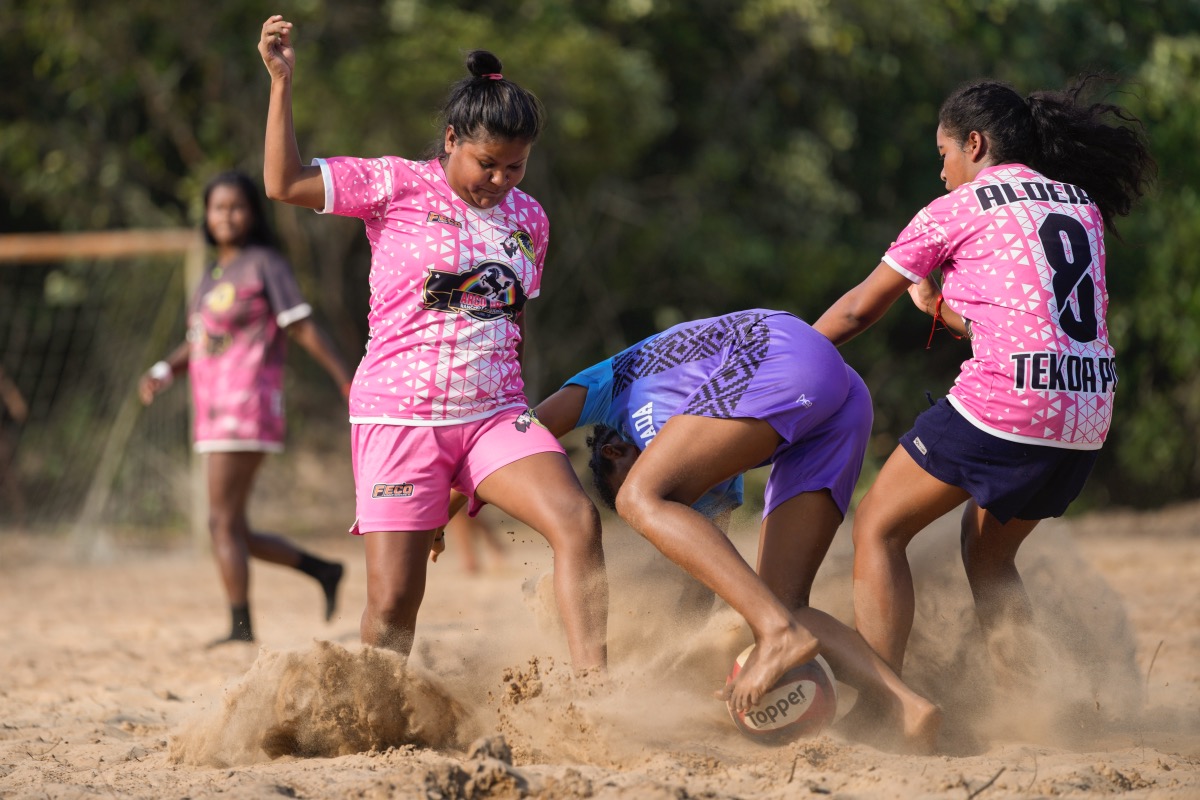

Indigenous athletes compete in a soccer match as part of the Indigenous Games, in the Tapirema community of Peruíbe, Brazil, Saturday, April 22, 2023. Hundreds of Indigenous athletes gather this weekend in the south of São Paulo state to hold their version of the Olympic Games. They will compete for medals in archery, tug of war, athletics, Indigenous wrestling and other sports. (AP Photo/Andre Penner)
By MAURICIO SAVARESE, AP Sports Writer
PERUÍBE, Brazil (AP) — This year’s Women’s World Cup in Australia and New Zealand is a world away from Indigenous Brazilian leader Guaciane da Silva Gomes, who lives in the isolated village of Tapirema in southern São Paulo state. She and her teammates, however, can still dream about it.
Gomes and her friends, Indigenous and non-Indigenous, play soccer on a dusty field between a lake and palm trees in the city of Peruíbe, 86 miles south of São Paulo. When she finds only a handful of other female players available, she joins the men and tackles just as hard to keep her passion running high—a passion she believes will grow with the Women’s World Cup.
“I will definitely find the time and place to watch, learn some techniques, watch the best of the best,” Gomes said last weekend after playing at the first Indigenous Games of Peruíbe. “What they do there also inspires us here. We are all seeking visibility.”
Brazil’s Indigenous women often lead their villages and groups, but for many years they were looked down on when they tried to play soccer. As the South American nation improves its structure for female players, Indigenous women say they also feel encouraged to take up the sport. They have done so nationwide, including in the heart of the Amazon where lower-league team Hiwi FC and its five Indigenous female players are based.
Gomes and her teammates in Peruíbe hope Brazil gets to host the next edition of the Women’s World Cup in 2027 so they can either play or watch matches live. One of the young Indigenous women dreaming about playing at home is teenage midfielder Suri Jará.
“Being a soccer professional would be great, so would archery and wrestling,” Jurá told the Associated Press, breathing heavily after a match at the Indigenous Games. “We definitely need more structure to have a chance. We play mostly in a friendly manner here, no big clubs are close and it is hard to go play in the city and come back. Still, we can dream.”
The closest top-division club from Peruíbe is Santos, which lies about 50 miles from the Indigenous village. Santos, the former home of soccer great Pelé, does have a professional women’s soccer team, but the club’s scouts rarely look for female talent too far from its headquarters.
Watching the Women’s World Cup will not be easy for many Indigenous Brazilian women living in remote regions where satellite television is scarce. Internet connections are less difficult to find, and many in the village will use their phones to watch matches.
When technology is not a problem, many young Indigenous women will likely have children to take care of. The group’s culture in most regions preaches that women above the age of 10 are already adults, which often puts them in early marriages and pregnancies, reducing their chances of playing.
Sitting on the sidelines of a soccer match, Dora Dina, a Tapirema village elder, said it was much more difficult for women to take up sports when she was young.
“I could never dream of doing this. Now our girls dream some dreams that are new, and soccer is one of them,” Dina said as players stumbled their way around the field. “I can’t say if one of them will ever be professional at this, but what matters now is that they can enjoy it. In the past, many women would never be able to enjoy it like they do now.”
Outside the village, a team of Indigenous women has managed to thrive in São Paulo. The Xondarias Guarani team was founded in January 2019 after two regional clubs merged. They play local tournaments of indoor soccer and train twice every week, hoping one day a scout will see them.
Vanessa Fernandes dos Santos is one of those expecting a call to join a club. The 19-year-old dos Santos plays on the right wing and is a big fan of Brazil star Marta, who might play her last Women’s World Cup at the age of 37 this year. Dos Santos doesn’t admit it, but her teammates say she wants to be the successor to the queen of Brazilian soccer.
“It is good to feel important for the team. That’s why I want to be professional one day,” a shy dos Santos said after an indoor soccer match near her village of Jaragua. “I am glad that both boys and girls want to watch us play. I know it wasn’t like this before.”
Xondarias Guaraní goalkeeper Jacileide Martins will be watching the Women’s World Cup from her village north of São Paulo. She doesn’t expect to be professional any longer, a dream she held for many years, but she has a Plan B.
“I really want to see a Guaraní woman play for a big club and, maybe, for the national team,” the 32-year-old Martins said. “We are closer to that now than when I started playing.”



[…] post Indigenous Brazilian Soccer Players Eye Women’s World Cup appeared first on Latino […]